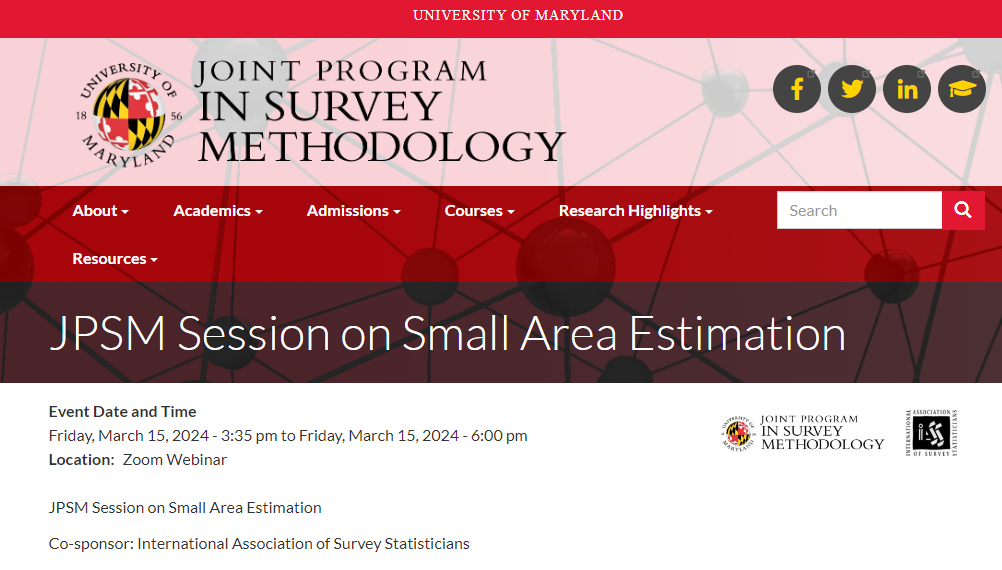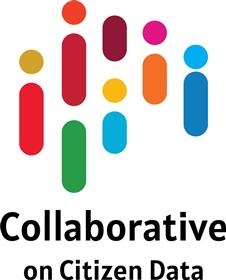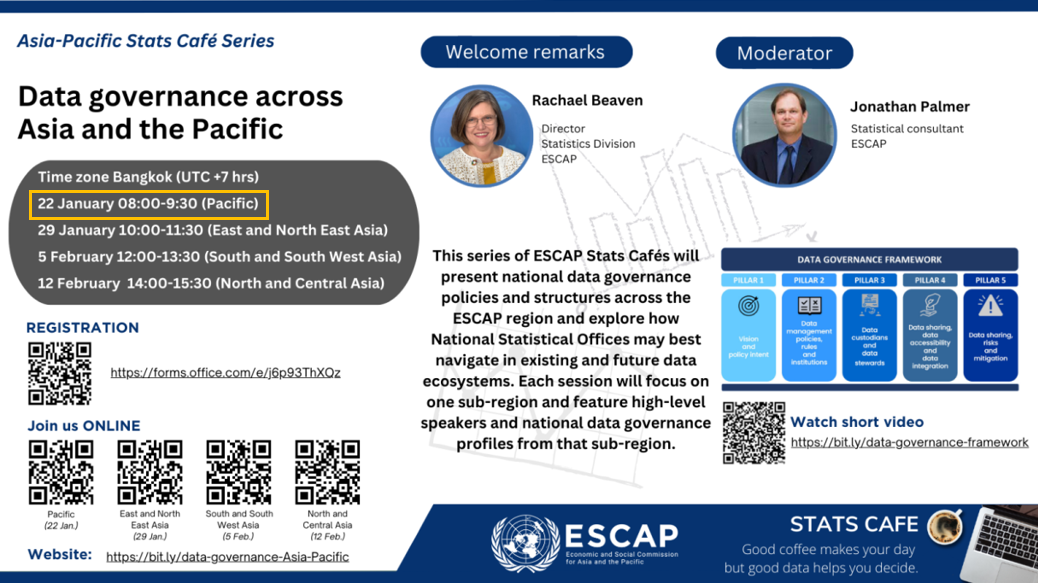Blog
Journal for Survey Statistics and Methodology
Special Issue: Survey Research from Asia-Pacific, Africa, the Middle East, Latin America, and the Caribbean
Deadline for submission: 16 August 2024
Guest Editors: Carolina Franco, Mamadou Diallo, Sunghee Lee, Denise Britz do Nascimento Silva
Contact: Carolina Franco (franco-carolina@norc.org) for questions
The Journal for Survey Statistics and Methodology is calling for submissions for papers on Survey Statistics, Survey Methodology, and Applications for its special issue on survey research from Asia-Pacific, Africa, the Middle East, Latin America, and the Caribbean.
Please find more information here.
Date: 12 June 2024, 4-5pm BST
Location: Online
More information: here
Speaker: Haoyi Chen
Register: link
Producing a future proofing UN Handbook on Household Surveys is part of the ongoing webinar series, co-organised with National Centre for Social Research, City, University of London, and the European Social Survey. As the Inter-Secretariat Working Group on Household Surveys (ISWGHS), is revising and updating the series of United Nations methodological publications on household surveys, the webinar will provide information on
- a summary of national consultations on the revision of Handbook;
- structure and content envisioned to be covered by the revision;
- dissemination platforms and tools and a vision for easy access and keeping the handbook up to date; and
- timeline and the consultative revision process.
Register today to join the webinar organized by the ISWGHS and the Global Network. We are happy to welcome Stephanie Eckman of the Social Data Science Center at the University of Maryland who will present on the topic of "The Science of Data Collection: Insights from Surveys can Improve Machine Learning Models".
Thursday, 30 May 2024, 08:30-09:30 AM NY time (check your time)
Whether future AI models make the world safer or less safe for humans rests in part on our ability to efficiently collect accurate data from people about what they want the models to do. However, collecting high quality data is difficult, and most AI/ML researchers are not trained in data collection methods. The growing emphasis on data-centric AI highlights the potential of data to enhance model performance. It also reveals an opportunity to gain insights from survey methodology, the science of collecting high-quality survey data.
This webinar will summarize lessons from the survey methodology literature and discuss how they can improve the quality of training and feedback data, which in turn improve model performance. Based on the cognitive response process model, the presenter formulates specific hypotheses about the aspects of label collection that may impact training data quality. She will also suggest collaborative research ideas into how possible biases in data collection can be mitigated, making models more accurate and human-centric.
The Speaker
Stephanie works at the Social Data Science Center of the University of Maryland as a Principal Research Scientist specializing in research into data quality and data collection methods. She holds a PhD in Survey Methodology from the University of Maryland. Her research interests include sampling methods in challenging environments and the combination of survey and other forms of data. She has taught sampling and designed samples around the world.
Date: 3-7 June 2024
Location: Peru
More information: here
The international conference will cover traditional topics in Small Area Estimation and also few emerging topics in survey and official statistics. It will combine information from multiple databases in developing reliable inferences at granular levels, and enhance collaboration among statisticians, survey methodologists, engineers, mathematicians, computer scientists, and others.
Organiser: Statistics Canada
Date/time: 29 Oct – 1 November 2024
Deadline for submitting proposal: 3 May 2024
More information: here
The 2024 International Methodology Symposium, organised by Statistics Canada, will be under the theme of "Shaping the Future of Official Statistics". The 2024 International Methodology Symposium Organizing Committee is calling for papers that examine methodological challenges related to the production of official statistics in a modern era.
Date: 2-3 September 2024
Location: Bristol (UK), hybrid
Deadline for submitting proposal: 6 June 2024
More information: here
The conference, organised for the 7th round of the Multiple Indicator Cluster Surveys (MICS) programme, is a collaboration among UNICEF, Bristol Poverty Institute (University of Bristol) and Equity for Children (The New School). The proposed papers will be based on analysis of MICS data, dealing with children, adolescents, youth and their families and households.
Date/time: 9 May 2024 (Thursday), 11am ET
Speakers: Amparo Palacios-López, Program Manager at the World Bank Living Standards Measurement Study (LSMS) unit, and Ivette Contreras, Economist for the Living Standards Measurement Study (LSMS)
Join: link
An event under Let's Talk Data series, organized by the World Bank, will explore whether alternative survey methods can address the underreporting of labor market outcomes for women and young men, and thus improve the measurement of underlying gender- and age-based gaps.
Date/time: 30 May 2024 (Thursday), 8:30-9:30am ET
Speaker: Stephanie Eckman, Researcher and Data Scientist, Social Data Science Center, University of Maryland; Principal Research Scientist, Amazon
Register: link
The webinar on "The Science of Data Collection: Insights from Surveys can Improve Machine Learning Models", jointly organized by the Inter-Secretariat Working Group on Household Surveys (ISWGHS) and the Global Network of Data Officers and Statisticians, will feature a presentation by Stephanie Eckman of the Social Data Science Center at the University of Maryland.
The webinar will include insights from survey methodology and explore how lesson learnt can improve the quality of training and feedback data, which in turn improve model performance in Machine Learning Models.

The Global Consultation, a crucial step in the development of two draft guidance documents under the auspices of the United Nations Expert Group on National Quality Assurance Frameworks, is now underway. Your valuable input is needed by the deadline of 4 June 2024.
- Draft Module for Quality Assurance when using Administrative and Other Data Sources to produce Official Statistics
- Draft Maturity Model on Quality Culture in Official Statistics

Join the UN-GGIM: Europe webinar - UN-GGIM: Europe Webinar -Toolbox for implementing the UN-IGIF: A practical discussion on putting the framework in action. The webinar will be held on 23 April 2024, 12:30 – 14:30 (CEST).
The overall aim of the webinar is to enhance the knowledge and understanding about the existing approaches to implementing the UN-IGIF. It will provide an overview of the tools available to help strengthen national geospatial capabilities – such as developing detailed Country-Level Action Plans or adapting specific elements of the nine Strategic Pathways. Elements of these approaches can be adopted depending on a country’s situation, in terms of stakeholder collaboration, funding, expertise, needs, or data availability. This webinar builds on the previous webinar: An introduction to the United Nations Integrated Geospatial Information Framework (UN-IGIF) on 27 Sep 2023.
For the registration to the webinar please follow this link. For the draft of the concept note, please consult this page. Please feel free to forward information about this webinar to interested colleagues and peers.
The Environment Statistics Section (ESS) of the United Nations Statistics Division (UNSD), convened its Tenth meeting of the Expert Group on Statistics during the 3, 4, 6 and 10 October 2024 (https://unstats.un.org/unsd/envstats/fdes/fdes_eges10.cshtml). During this meeting there was a recommendation to create a small group on climate change questions for censuses and surveys which will assist countries to collect and compile data on the Global Set of Climate Change Statistics and Indicators (Global Set) where relevant. The Global Set, following a global consultation in 2021, was adopted at the fifty-third session of the United Nations Statistical Commission in March 2022 as the framework for climate change statistics and indicators to be used by countries when preparing their own sets of climate change statistics and indicators according to their individual concerns, priorities and resources (decision 53/116, Climate Change Statistics, https://unstats.un.org/UNSDWebsite/statcom/session_53/documents/2022-41-FinalReport-E.pdf)
The purpose of the group is multifunctional. In addition to reviewing existing sections and questions from censuses and surveys that are used to collect data for statistics and indicators of the Global Set it will identify new and innovative questions that countries can include in censuses and surveys to collect data for the Global Set at the national level. It will also review and update metadata for the Global Set which require data from censuses and surveys especially those relating to mitigation, adaptation and vulnerability. Eventually, the work of this group will be extended to build a repository of core and non-core questions suitable for censuses and surveys to collect data on climate change issues.
In order to assist countries the ESS with the support of the EGES offers a hub via its website, featuring a compilation of surveys and censuses that can be queried under various themes on the environment and climate. To further support countries in the development/strengthening of Climate Change statistics programmes, the Section has developed supporting tools including the Implementation Guidelines and Climate Change Statistics and Indicators Assessment Tool (CISAT).
With the intention to cross fertilize efforts and leverage expertise, the group recently collaborated with the Inter Secretariat working group on household surveys (ISWHS) group. Initial work among the two groups includes an exchange of the scope, objectives, outputs and links to resources and in this regard a power point presentation was presented by UNSD at the Inaugural Meeting on Revision of the United Nations Handbooks related to Household Surveys in China from 22-24 Jan 2024: https://unstats.un.org/iswghs/EventDetails/inaugural-meeting-handbook-hs-Jan2024 on the work of this small group.
At its 55th session, the Statistical Commission, inter-alia, approved the renaming of the Expert Group on Environment Statistics to the Expert Group on Environment and Climate Change Statistics to cover both topics given their close interrelationship. Further, the Commission encouraged national statistical systems to invest in the development of climate change statistics by enhancing the use of administrative data, designing specialized surveys or other data collection tools, and including climate and environment-related questions in relevant censuses and sample surveys as appropriate. The work of this small group will be presented at the 11th meeting of the Expert Group on Environment and Climate Change Statistics.

Upcoming events
- A webinar on small area estimation, organized by the Joint Program in Survey Methodology
- Such a great honour to be speaking on our work with Dr. Fay (Fay-Harriot model), William Bell (US Census Bureau, the famous SAIPE programme), Partha Lahiri (Director of the Joint Program in Survey Methodology) and David Newhouse (World Bank, bringing in the geospatial dimension)
- Date/time: 15 March 2024, 3:35-5:00pm ET
- Concept note/registration: here
- Bayesian Variable Selection, organized by American Statistical Association’s Committee on International Relations in Statistics (CIRS) and by Statistics Without Borders (SWB)
- Speaker: Professor Marina Vannucci
- Date/time: 6 March 2024, 12-1:30pm ET
- Concept note/registration: here

TOPIC - Your Voice Matters: Contributing to the Copenhagen Framework on Citizen Data and its implementation
WHEN - Thursday, 15 February 2024 | 9:00-10:30am EST (REMOTE)
REGISTRATION - To register: link

Here are the new/exciting updates from the Inter-Secretariat Working Group on Household Surveys:
- We organized our first meeting on the revision of the Handbooks on household surveys, 22-24 January. Huge thanks to all the experts and the National Bureau of Statistics of China for your support. Presentations for the meeting are available here. A short/concise report of the meeting is available here.
- We are dedicating an open side event to continue our conversation on the household survey handbook revision. During the side event, we will provide an update on what has been discussed in China, have a conversation with experts and solicit feedback from the audience.
- Date/time: 13 Feb, 9-10:30 ET
- Concept note/registration: here
- For a quick summary of the work of the ISWGHS in 2023: look for agenda item 4(c), Section X
- A primer on SAE with geospatial data for input: here
You are invited to join the Asia-Pacific Stats Cafés on Data Governance across Asia and the Pacific for Pacific subregion, to be held on 22 January to 12 February 2024, Register for the event here.
- Click here to join the meeting
- More information about this session on Data Governance across Asia and the Pacific for Pacific subregion is available in the attached concept note.
- Event’s webpage is https://bit.ly/data-governance-Asia-Pacific.

Powered by a free Atlassian Confluence Community License granted to https://www.atlassian.com/software/views/community-license-request. Evaluate Confluence today.
- Kolekti ThemeBuilder Powered by Atlassian Confluence 8.5.9
- Kolekti ThemeBuilder printed.by.atlassian.confluence
- Report a bug
- Atlassian News